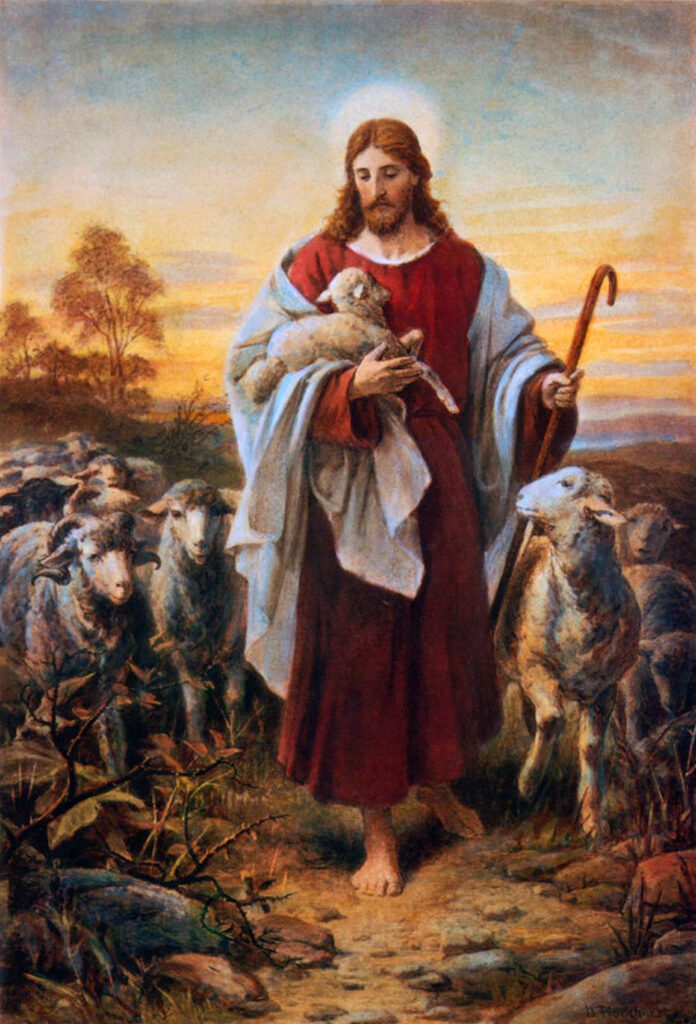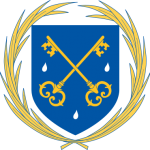Home l Liturgy & Sacraments l Liturgical Calendar
The Second Sunday after Easter – Sunday, April 14, 2024

This Sunday goes under the name of the Good Shepherd Sunday, because, in the Mass, there is read the Gospel of St. John, wherein our Lord calls himself by this name. How very appropriate is this passage of the Gospel to this present Season, when our Divine Master began his work of establishing and consolidating the Church, by giving it the Pastor, or Shepherd, who was to govern it to the end of time!
In accordance with the eternal decree, the Man God. on the fortieth day after his Resurrection, is to withdraw his visible presence from the world. He is not to be again seen upon the earth till the Last Day, when he will come again to judge the living and the dead. And yet, he could never abandon mankind, for which he offered himself on the Cross, and which he delivered from death and hell by rising triumphantly from the Grave. He will continue to be its Head after his Ascension into heaven: but what shall we have, on earth, to supply his place? We shall have the Church. It is to the Church that he will leave all his own authority to rule us; it is into the hands of the Church that he will entrust all the truths he has taught; it is the Church that he will make the dispenser of all those means of salvation, which he has destined for the world.
This Church is society, unto which all mankind is invited. It is composed of two classes of Members; the governing and the governed; the teaching and the taught; the sanctifying and the sanctified. This Society is the Spouse of Christ; it is by her that he produces his elect. She is the one only Mother of the elect; out of her bosom, there is no salvation.
But how is this society to subsist how is it to persevere through the long ages of time, even to the Last Day? who is to give it unity and adhesion of its parts? what is to be the visible link between its members, —the palpable sign of its being the true Spouse of Christ, in the event of other societies rising up and disputing her titles? If Jesus himself could have remained with us, we should have had nothing to fear, for where he is, there also are truth and life; but, as he says, he is going, and we may not as yet follow him. Give ear, then, and learn what is the primary quality of the true Spouse of Christ.
Jesus was one day, previous to his Passion, in the country of Cesarea Philippi; his Apostles were standing around him, and he began questioning them about what they thought of him. One of them, Simon the son of John or Jonas, and brother to Andrew, answered in the name of all, and said: Thou art Christ, the Son of the living God! Jesus expressed his pleasure at receiving Simon’s testimony, which was not the result of any human knowledge, but the expression of divine revelation there and then granted to him and he immediately told this Apostle, that from that time forward he was to be, not Simon, but Peter (which means rock). Christ had been spoken of by the Prophets under the name of Rock, or Stone; by thus solemnly conferring upon his Disciple title so characteristically that of the Messias,
Jesus would give us to understand, that Simon was to have something in common with himself, which the other Apostles were not to have. -After saying to him: “Thou art Peter, (that is, thou art the Rock)—he added: And upon this Rock, I will build my Church. (St. Matthew 16:18)
Let us weigh the force of these words of the Son of God: I will build my Church. He has, then, a project in view, —he intends to build a Church. It is not now that he will build it, but at some future period; but one thing we already know as certainty, —it is, that this Church will be built on Peter. Peter will be its foundation; and whosoever is not on that foundation, will not belong to the Church. Let us again give ear to the Text: And the gates of hell shall not prevail against my Church. In scriptural language, gates signify the powers: the Church of Christ, therefore, is to be proof against all the efforts of hell. And why? Because the foundation, which Jesus is to give to it, shall be one that no power can shake. The Son of God continues: And I will give to thee the keys of the Kingdom of heaven. In the language of the Jews, keys signify the power of governing; and in the Gospel Parables, the Kingdom of Heaven is the Church built by Christ. By saying to Peter, (which is henceforth to be Simon’s name,) I will give to thee the keys of the Kingdom of heaven, Jesus implied this: “I will make thee the King of my Church, of which thou art to be the Foundation.” (Ibid 16) Nothing could be clearer. But let us remember that all these magnificent promises regard the future.
That future has now become the present. We are now come to the last days of Jesus’ visible presence
here below. The time is come for him to make good his promise and found the Kingdom of God. –that Church which he was to build upon the earth. The Apostles, in obedience to the order sent them by the Angels, are come into Galilee. Our Lord appears to them on the shore of the lake of Tiberias: after providing them with mysterious repast. and whilst they are all attentive to his words, he suddenly addresses himself to Peter: Simon, son of John, lovest thou me? Observe, he does not call him Peter; he, as it were, goes back to the day when he said to him Simon, son of Jonas, thou art Peter he would have his Disciples note the connection between the promise and its actual fulfilment. Peter, with his usual eagerness, answers his Master’s question: Yea, Lord, thou knowest that I love thee. Jesus resumes, with a tone of authority: Feed my Lambs! Then repeating the question, he says Simon, son of John, lovest thou me? Peter is surprised at his Master’s urging such an inquiry still, he answers with the same simplicity as before: Yea, Lord, thou knowest that I love thee: and as soon as he has given answer, Jesus repeats the words of investiture Feed my Lambs! (St. John 21:15)
The Disciples respectfully listen to this dialogue they see plainly that, here again, Peter is made an object of Jesus’ partiality and is receiving something which they themselves are not to receive. They remember what happened at Cesarea Philippi, and how, ever since that day, Peter has been treated by their Master with especial honor. And yet, there is another privilege or office to be added to this of feeding the Lambs. third time, then, Jesus says to Peter: Simon, son of John, lovest thou me? This is too much for the Apostle. These three questionings of his love bring to his mind the three denials he had so sinfully made to the servant girl of Caiphas. He feels the allusion to his recent infidelity; and this third time, his answer implies prayer for forgiveness; his reply bespeaks humility rather than assurance: Lord! says he, thou knowest all things! Thou knowest that I love thee. Then, making Peter’s authority complete, Jesus pronounces these imposing words Feed my Sheep! (St. John 21:17)
Here, then, we have Peter made Shepherd by Him, who says of himself: I am the good Shepherd. Firstly, our Lord gives his Apostle, and twice over, the care of his Lambs; —this does not make him the complete Shepherd: but when he bids him feed his Sheep too, the whole Flock is subjected to his authority. Now, therefore, let the Church show herself, let her take her stand, let her spread herself through the length and breadth of the nations; Simon, the son of John, is proclaimed its visible Head. Is the Church a Building? he is the Foundation-Stone, the Petra, the Rock. Is she a Kingdom? he holds the Keys, that is, the sceptre. Is she a Fold? he is the Shepherd.
Yes, this Church, —which Jesus is now organizing, and is to be proclaimed to the world on the day of Pentecost, —is to be a Fold. The Word, the Second Person of the Blessed Trinity, is come down from heaven, that he may gather together in one the children of God, that were dispersed; (Ibid. 16:52) and the time is at hand when there shall be but one Fold and one Shepherd. (Ibid. 10:16) Jesus our Divine Shepherd we bless thee, we give thee thanks. It is by thee that the Church, thou art now founding, subsists and lives through every age, congregating and saving all that put themselves under her guidance. Her authority, her strength, her unity, all come from thee, her infinitely powerful and merciful Shepherd We likewise bless and thank thee for that thou hast secured this authority, this strength, this unity, by giving us Peter as thy Vicar, Peter our Shepherd in and by thee, Peter to whom all, both Sheep and Lambs, owe obedience, Peter in whom thou, our Divine Head, wilt be forever visible, even to the end of the world!
Copyright © 2015-2024 Saint Joseph Catholic Church, Latin Mass Parish, 602 S 34th St., Tacoma, WA 98418. All Rights Reserved.
Website comments or questions: info@saintjosephtacoma.org


